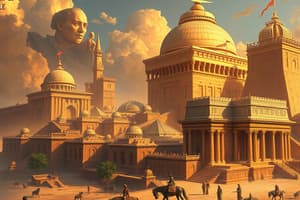Podcast
Questions and Answers
Who was the founder of the First Empire and known for his military prowess and diplomatic skills?
Who was the founder of the First Empire and known for his military prowess and diplomatic skills?
King Sargon I
Which leader of the First Empire expanded the empire further westward and is known for monumental construction achievements?
Which leader of the First Empire expanded the empire further westward and is known for monumental construction achievements?
Naramsin
What type of structures did the inhabitants of the First Empire demonstrate remarkable skill in constructing?
What type of structures did the inhabitants of the First Empire demonstrate remarkable skill in constructing?
Ziggurats and temples
What were some notable aspects of the culture of the First Empire in terms of agriculture?
What were some notable aspects of the culture of the First Empire in terms of agriculture?
What artistic expressions flourished during the First Empire?
What artistic expressions flourished during the First Empire?
Who were the Sumerians, and what role did they play in the rise of the First Empire?
Who were the Sumerians, and what role did they play in the rise of the First Empire?
When did the Akkadians emerge as a significant power, and who was the first king of the First Empire under their rule?
When did the Akkadians emerge as a significant power, and who was the first king of the First Empire under their rule?
What regions were incorporated into the territory of the First Empire as it expanded rapidly?
What regions were incorporated into the territory of the First Empire as it expanded rapidly?
Describe the centralized control established by the leaders of the First Empire.
Describe the centralized control established by the leaders of the First Empire.
What were some key characteristics of the cultural aspects of the First Empire?
What were some key characteristics of the cultural aspects of the First Empire?
Flashcards are hidden until you start studying
Study Notes
First Empire: Rise, Leaders, and Culture
The ancient world was marked by numerous empires, each with its unique characteristics, achievements, and downfalls. This brief overview will focus on one of the earliest known civilizations, the First Empire, exploring its rise, leaders, and cultural aspects.
Rise of the First Empire
The rise of the First Empire can be traced back to the Sumerians, who inhabited the southern region of Mesopotamia around 4000 BC. They established the earliest known civilization, which would eventually give rise to several empires throughout history. The Sumerians were skilled farmers and engineers, creating the first irrigation systems, canals, and waterways that allowed them to settle down and form permanent settlements.
The Akkadians, another early Semitic people, emerged as a significant power in the region around 2334 BC. They overthrew the Sumerians, marking the beginning of the First Empire under King Sargon I. This empire was characterized by centralized control, with power concentrated in the hands of the king and his administrative officials. It expanded rapidly, incorporating neighboring regions such as Elam, Meluhha, Marhashi, Eshnunna, and Subartu into its territory.
Leaders of the First Empire
The leaders of the First Empire played crucial roles in establishing and maintaining the empire's power and influence. Some key figures include:
King Sargon I (2334 BC)
The founder of the First Empire, King Sargon I was a military genius who united the city-states of Mesopotamia under his rule. He was known for his military prowess and diplomatic skills, successfully managing relations with neighboring kingdoms and establishing a centralized administrative system. His reign laid the groundwork for the Akkadian civilization and marked the beginning of the empire.
Naramsin (2286 BC)
Naramsin, the grandson of Sargon I, continued his grandfather's legacy by expanding the empire further westward. He is known for his monumental achievements in construction, including the ziggurats of Nippur and Ur. During his reign, he successfully maintained peace within the empire and established trade relations with regions beyond Mesopotamia.
Culture of the First Empire
The culture of the First Empire was characterized by advancements in agriculture, engineering, and art. Some notable aspects include:
Agriculture
The early civilizations relied heavily on irrigation systems to cultivate crops like barley, wheat, and sesame seeds. This allowed them to develop permanent settlements and establish the foundations of their societies.
Engineering
The inhabitants of the First Empire demonstrated remarkable skill in constructing monumental structures, such as ziggurats and temples, which served as religious centers and administrative hubs. These architectural marvels showcased the advanced engineering capabilities of the era.
Art
Artistic expression flourished during the First Empire. Sumerians created pottery, metalwork, and carved stone sculptures that depicted human figures and animals. Additionally, they developed the cuneiform writing system, which allowed them to record their history, laws, and religious beliefs.
In conclusion, the First Empire marked a significant milestone in human history. Its rise, led by visionary leaders like King Sargon I and Naramsin, was characterized by the consolidation of city-states into a centralized power. The empire's cultural achievements, particularly in agriculture, engineering, and art, laid the groundwork for future civilizations and continue to influence our understanding of the ancient world.
Studying That Suits You
Use AI to generate personalized quizzes and flashcards to suit your learning preferences.




